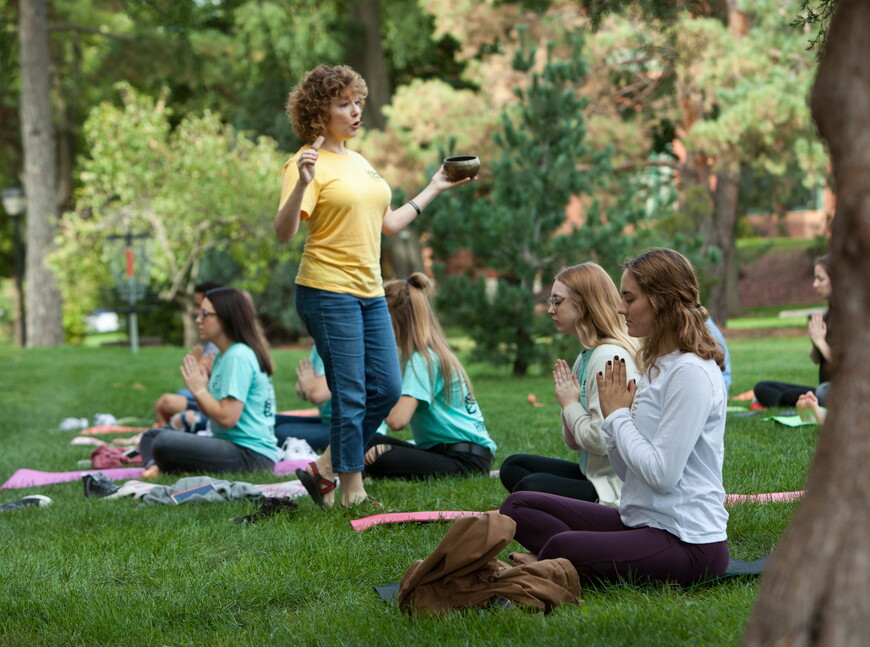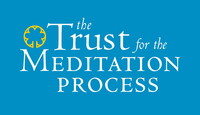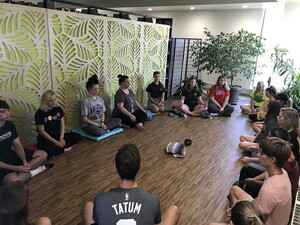The Tools to Thrive
Since the Fall of 2013, Communications Studies Professor Dr. Karla Jensen has assisted NWU’s core mission of transformative learning through a novel approach to student support. Dr. Jensen recognizes today’s students’ heightened anxiety and uncertainty and seeks to provide students with a toolkit that will enable them to overcome challenges of any size.
In Dr. Jensen’s search for a method to support her personal well-being, she discovered mindfulness. “Mindfulness is being in the present moment. It’s a skill that we all have, and we need to learn how to practice and harness that skill.”
Dr. Jensen earned her 200-hour National Yoga Alliance teacher certification in 2013 and has since made it a priority to spread the practice of mindfulness across the Nebraska Wesleyan community. During Dr. Jensen’s 2016 sabbatical, she studied contemplative pedagogy with experts from the United States, England and Austria; she completed her 500-hour yoga certification with an emphasis on meditation and began a year-long program to teach Koru Mindfulness to emerging adults.
The Koru Mindfulness Method developed by faculty at Duke University Medical Center was created especially for an 18-29-year-old audience. Based on Jon Kabat-Zinn’s Mindfulness-Based Stress Reduction Program, Koru includes practices that emphasize a focus on the present to become aware of one’s thoughts and actions. Visualization exercises, guided meditation and focused breathing reduce stress and pain, encourage self-care and compassion and improve quality of sleep. Researchers have witnessed the overwhelmingly positive impact these mindfulness practices have on individuals’ physical and emotional health.
Dr. Jensen has witnessed first-hand the astounding impact Koru Mindfulness has on students who practice meditation. “The word ‘Koru’ comes from the New Zealand Maori word for unfurling fern frond. Imagine time-lapse photography of a fern coming out where it spirals, blossoms and grows, then suddenly, a huge leaf appears. That’s what happens with students who experience mindfulness training. They start green with great possibility. When they’re nourished and fertilized in the right way, they start to grow into themselves. That’s what this training does.”
Dr. Jensen has built a relationship with the Trust for the Meditation Process to bring these benefits to Nebraska Wesleyan’s campus. The Trust for the Meditation Process, an organization founded in 1986, focuses on the recovery of the Western world’s contemplative practices, the need for mindfulness to heal our divided society and small efforts that can make a difference in schools and churches. Their overall mission is to spread meditation, mindfulness and contemplative prayer practices.
Last year this organization awarded NWU a competitive grant to train faculty and staff in mindfulness and help the NWU community cultivate the ability to pay attention to the present moment. This year the Trust for the Meditation Process has renewed this grant enabling Dr. Jensen to mentor additional NWU faculty and staff as they earn their mindfulness teaching certification. Dr. Jensen began this mentorship in 2021 with Janelle Andreini, assistant dean for student success and career development at NWU, and starting in 2023 Dr. Jensen will direct the training of Jen Dyson, NWU’s head women’s soccer coach, Ryan Kathman, assistant professor of theatre, and Rebecca Czaja-Stevens, assistant professor of social work.
Throughout 2023, Coach Dyson, Professor Kathman and Professor Czaja-Stevens will participate in four training phases. Phase one involves the formal training and practice of Mindfulness-Based Stress Reduction (MBSR) in order to create a foundation of self-care and meditation practice. Participants next take part in a three-day workshop covering multiple meditation methods all supported by empirical research studies. A three-day silent meditation retreat follows the training. Next, participants teach three practicum courses. In 2017 Dr. Jensen completed her practicum with NWU students and students from the Lincoln Correctional Center while Janelle Andreini fulfilled part of her practicum with NWU students in the Social Work Department. In the last phase, the faculty and staff submit reflective essays to the Center for Koru Mindfulness along with student feedback and videos of them guiding a class in the different meditation methods.
When Dr. Jensen chose the faculty and staff for mindfulness training, she looked for individuals who would have maximum reach within the NWU community. This year the Athletics, Theatre and Social Work Departments fit this goal.
“Students in these departments have the same kinds of stresses and expectations as all the other students. It is just magnified a bit. All students are juggling classes and possibly work schedules and extracurriculars, but the thing that is unique about those populations is that athletes have extra stress from competitions, theatre students have extra stress from memorizing lines or auditioning and social work students include nontraditional adult and graduate students who may be caring for children or other family members or who are working full-time.”
Dr. Jensen is confident that training NWU faculty and staff in Koru Mindfulness will have a ripple effect throughout the community. The faculty and staff who earn their Koru Mindfulness teaching certification will bring the benefits of mindfulness to other faculty, staff and students, who may go on to share mindfulness practices with their peers. Dr. Jensen specifically encourages faculty and staff to spread mindfulness practices to students of color, LGBTQ+ students, first-generation college students and other community members who may experience more stress from experiencing prejudice or discrimination. Janelle Andreini and Dr. Jensen have already witnessed the impact of their training on students in communication studies and the career center. Since Dr. Jensen began incorporating mindfulness into her courses, students have reported that they have been able to navigate difficult conversations more effectively, are less stressed about their future and have an increased awareness of gratitude for their experiences and relationships.
Janelle Andreini has noticed similar responses from students she interacts with in Student Life. Currently, Janelle works with students one-on-one regarding career and major exploration, job and internship search, resume and cover letter development and graduate school preparation. Another part of her position involves providing outreach to transfer students who are struggling academically or experiencing other challenges.
In Janelle’s student outreach, she incorporates the method of pausing and taking a deep breath, allowing students to feel calmer, free of judgment and more present. Janelle recognizes the importance of being able to provide students with these techniques while they meet with her, as career development often involves making major decisions about a student’s future. Not only does Janelle acknowledge the necessity of mindfulness in Student Life, but she also understands its importance to Nebraska Wesleyan overall.
“Addressing mental health is critical to achieving our university mission. We need to create spaces for students to create a skill set to do hard things. Academics, interacting socially and getting involved can be hard. We need to help students develop a toolkit so they can make the most of what Nebraska Wesleyan has to offer.”
As part of what she has named the Contemplative Campus Initiative, Dr. Jensen hosts guided meditation each Monday and she regularly teaches yoga on campus. Dr. Jensen has also created courses to teach mindfulness, including “Be. Here. Now.: Mindfulness Theory and Practice,” which won the United Methodist Church Board of Higher Education’s Cutting-Edge Curriculum Award in 2018. In Dr. Jensen’s communication studies classes that do not have an overt focus on mindfulness, she includes Koru practices to improve the classroom experience. She teaches students how to recognize their present thoughts, take a moment to breathe and center themselves at the beginning of each class period.
“When we come together, we take a breath. We sit and center and we transition to the present moment. When I notice that students are nervous about giving a speech or engaging in a challenging dialogue, we take a breath. We don’t do it because it’s cute or trendy. We do it because it works.”
During the upcoming year, Dr. Jensen will monitor indicators of student well-being, including data from the Counseling Center and retention data of students served by the project, to analyze the benefits NWU students receive. After collecting this data, Dr. Jensen looks forward to incorporating mindfulness and its benefits further into the student experience.
Specifically, Dr. Jensen hopes mindfulness will become further engrained in the education and culture on campus. She looks forward to a day when, as soon as students step foot on campus, they are introduced to mindfulness practices that will support them as they begin their journey at Nebraska Wesleyan. Incorporating these practices into Prairie Wolves Welcome and the Archway Curriculum would fulfill Dr. Jensen’s goal to spread mindfulness across the campus community.
Organizations awarding grants to Nebraska Wesleyan make specialized training such as Dr. Jensen’s mindfulness project possible. Grants allow faculty and staff to test innovative ideas and implement special projects that directly support students’ current experiences at NWU in everything from hands-on research in the physical sciences to effectively handling the stress common to college-age students. In the case of this mindfulness project, Dr. Jensen envisions a future where the resources made possible by the Trust for the Meditation Process assist the entire campus community in building resilience to manage stress and thrive at NWU.
“My hope is that this Contemplative Campus Initiative goes well beyond students. When staff, administrators and faculty become trained in or at least regularly practice mindfulness, that is when the real change happens. When we can be more aware of and regulate our thoughts and feelings and when we can be fully present with our students, that’s where the magic is.”
To learn more about the Trust for the Meditation Process, visit https://trustformeditation.org/
Story by Madison Laake ('23)






